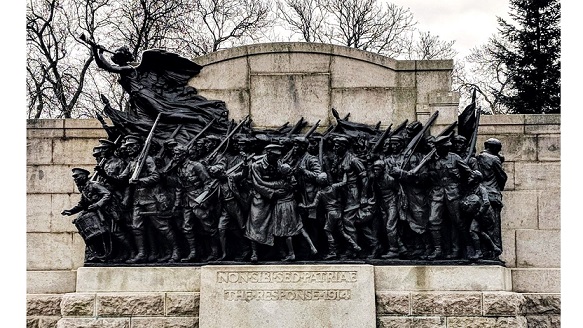.
The Great War
Ever be their memory,
Those interred across the sea,
Men who, fighting evil, fell,
Who endured the martial Hell;
Those who to their homes returned,
Shot or shell-shocked, broken, burned,
Shrapnel fast within the flesh,
Wounds and scars forever fresh;
Those who coped in stoic silence,
Not relating dreams of violence.
Today, those veterans all are gone.
They lived their lives and carried on
Or died in Europe in the War.
What’s left to say? There is no more.
.
.
Mary Gardner is a poet living in Florida.















I found the seven syllable lines of this poem give it the staccato punch of gunfire which emphasises the poem’s message.
Thanks for the read, Mary.
Thank you for reading it, Paul. I tried to capture the unrelenting sadness WWI held for American soldiers, who either were buried far from home or carried the burden of the war for the remainder of their lives.
Nice, Mary. Reminds me of the lines from the Gettysburg address:
“The brave men, living and dead, who struggled here, have consecrated it, far above our poor power to add or detract. The world will little note, nor long remember what we say here, but it can never forget what they did here.”
Paddy, thank you for the comment and the reminder of Lincoln’s words.
During the Cold War, my husband was stationed in Germany, and we visited numerous World War I cemeteries. Verdun was especially sobering.
Beautiful poem Mary. Perfect for today. Bless you for sharing it with us.
Thank you, Russel.
Thanks to Evan Mantyk for his kind suggestions of a few tweaks that polished this poem.
Mary, this is nearly perfect. It would fit beautifully on a memorial tablet if we were still erecting such. I thank you (and Evan Mantyk for the polish) for this worthy remembrance of men who fought a war already faded from most memories. It’s important because war itself stays the same, though weapons that inflict war’s wounds may change.
Thank you, Margaret, for your kind words. Unfortunately, we always have more wars for which to erect memorial tablets.
Mary, you have captured in hard-hitting yet beautifully crafted couplets exactly what today is all about, and I applaud your fine poem. Thank you very much indeed for this powerful reminder on Memorial Day!
Thank you for the praise, Susan. Would that this poem were unnecessary!
This poem has the same trochaic meter as Auden’s piece on the death of William Butler Yeats:
Earth, receive an honored guest —
William Yeats is laid to rest.
Let the Irish vessel lie
Empty of its poetry.
As Paul has said above, it carries a staccato punch, and is a good choice for short but serious composition.
Thank you, Joseph. Trochaic meter commands the reader’s attention; iambic tends to be dreamy.
A succinct and moving tribute to the countless fallen and survivors of that dreadful conflict.
Dreadful indeed, David, and I am grateful that it hasn’t been repainted as glamorous by the movies (which is what Hollywood did for a long time with the Civil War and WWII). Here is a song from the Great War: https://www.youtube.com/watch?v=DngSe0HwstM
Thank you for the good words.
Congratulations on your moving poem, Mary, so full of sincere feeling. I like the way you change to iambic tetrameter for the last four lines when you move to the present. Your final line captures the bleakness of it all.
Thank you very much, Paul. It’s good to know one’s poem conveys the intended emotion to the reader.
The change of meter came spontaneously as I shifted from thinking of individuals to honoring those soldiers as a group. The final line, though, was Evan’s suggestion. I’m sure he will be pleased when he reads your comment.
Hello Mary
I would like to make three suggestions if it won’t cause offence. I offer them because the rest of your moving poem merits it.
My little understanding of WW1 is that, unlike WW2, it was a “bad” war: one that should have been avoided. Although undoubtedly acts of evil were performed, as in Belgium, Austria-Hungary and Germany at this time were not generally speaking genocidal. Therefore I would suggest for your third line:
Men who fought the Kaiser fell,
I also feel “martial” is not quite right in this context. So for the fourth line I would suggest:
Who endured the fires of Hell;
And for the tenth line:
Bottling in their dreams of violence
Please forgive my impertinence. I welcome corrections of my views of the conflict––and manners!
Paul, your comments demonstrate good manners without a trace of impertinence. Thank you for your input. It’s good food for thought.